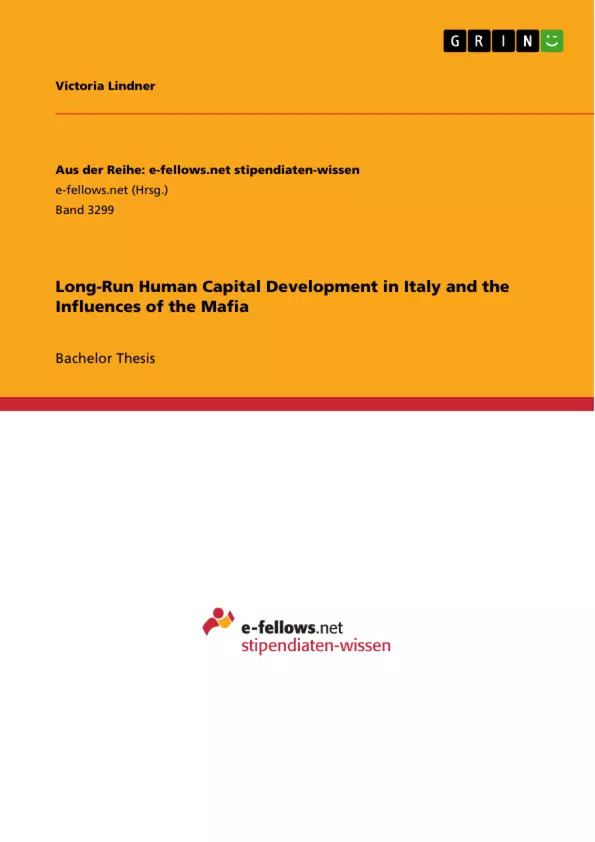This work has the objective to offer a deeper insight in the Italian human capital development in the long run. Hereby, the work is also investigating the differences in development between specific Italian regions.
This work is dedicated to research the long-run development of human capital in Italy, both for the country as a whole and regional differences. The author wants to take a closer look on the north-south descent. First, the age data sources, its structure and subsequently the sources and collecting of independent variables in the dataset are described. These independent variables will later be included in an empirical analysis about the connection of human capital and economic development. In this regard, the work will enlarge upon human capital development, especially regarding gender and region. In this section it shall be differentiated between bigger territories as well as the specific provinces of Italy. Then, the impact of different independent economic indicators on the numeracy value will be investigated with a regression analysis. In this context the time period from 1800 to 1900 will be considered more closely because of the presence of the mafia and criminal activities in the south of Italy. An empirical analysis shows if the increased presence of the mafia and criminality is influenced by the human capital value in specific provinces of Sicily, where the most famous mafia organization had its origin.
Inhaltsverzeichnis (Table of Contents)
- 1. Introduction
- 2. Data
- 2.1 Age Data and Data Structure
- 2.2 Independent Variables and Investigation of Sources
- 2.3 Problems and Difficulties
- 3. Human Capital Analysis Italy
- 3.1 Methodology
- 3.2 Human Capital Development in the Long-Run
- 3.3 Gender based Human Capital Development
- 3.4 Regional Human Capital Development
- 4. Empirical Analysis
- 4.1 Regional Human Capital Development
- 4.2 Difficulties in Regression Analysis
- 4.3 Endogeneity Problems and Multicollinearity
- 4.4 Main Results
- 5. Development of Mafia
- 5.1 Origin of the Mafia
- 5.2 Human Capital Influence
- 6. Conclusion
Zielsetzung und Themenschwerpunkte (Objectives and Key Themes)
The bachelor thesis aims to provide a comprehensive analysis of long-run human capital development in Italy, with a particular focus on regional differences. The study investigates the relationship between economic indicators and regional numeracy, drawing upon existing research and employing empirical analysis.
- Long-run human capital development in Italy
- Regional disparities in human capital
- The North-South divide in numeracy
- The impact of economic factors on numeracy
- The potential influence of criminal organizations on human capital development
Zusammenfassung der Kapitel (Chapter Summaries)
- Introduction: This chapter provides an overview of human capital as a crucial factor for economic development, highlighting the importance of education, skills, and talent. It introduces the research question and the context of regional disparities in Italy, focusing on the Mezzogiorno.
- Data: This chapter details the data sources used in the analysis, including age data, independent variables, and potential difficulties encountered in data collection.
- Human Capital Analysis Italy: This chapter outlines the methodology used for analyzing human capital development in Italy. It examines long-run trends, gender differences, and regional variations in human capital development.
- Empirical Analysis: This chapter presents the results of the empirical analysis, focusing on regional human capital development, challenges encountered in regression analysis, and the impact of economic indicators on numeracy.
- Development of Mafia: This chapter explores the origins and development of the Mafia in Italy, examining its potential influence on human capital development.
Schlüsselwörter (Keywords)
Human capital development, Italy, regional disparities, numeracy, economic indicators, North-South divide, Mafia, criminal organizations, empirical analysis, long-run trends, gender differences, regression analysis.
What is the main focus of this human capital study on Italy?
The study focuses on long-run human capital development in Italy, specifically examining regional disparities and the North-South divide in numeracy from 1800 to 1900.
How is the Mafia linked to human capital in this research?
The research investigates whether the increased presence of the Mafia and criminal activities in Sicily was influenced by or had an impact on the human capital values (numeracy) of that region.
What is "numeracy" in the context of this thesis?
Numeracy is used as a proxy for human capital, calculated using age-heaping methods to estimate the basic mathematical and cognitive skills of the population.
What time period does the empirical analysis cover?
The analysis primarily considers the 19th century (1800 to 1900), a crucial period for the formation of the Italian state and the origin of major criminal organizations.
What are some difficulties mentioned in the data collection?
The author discusses problems with age data sources, potential endogeneity in regression analysis, and multicollinearity between different economic indicators.



